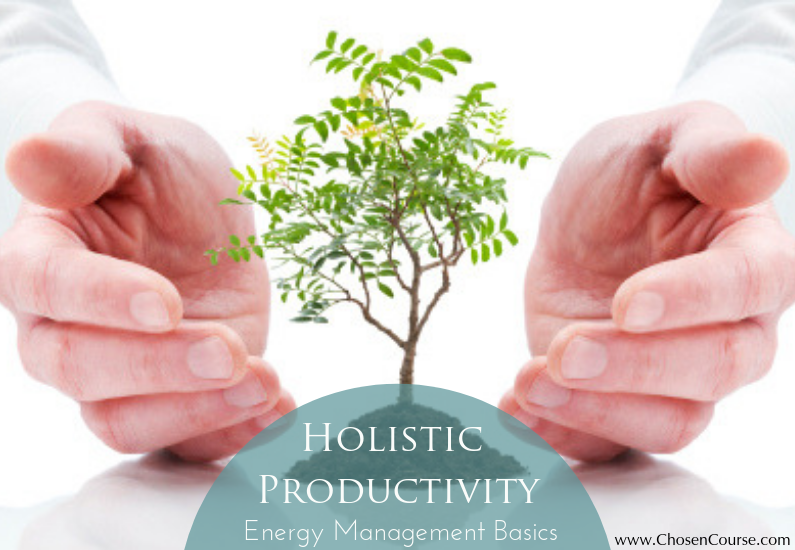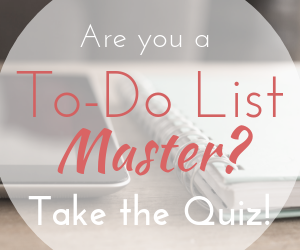For years, I have written and spoken on the topic of holistic organizing, which involves taking more than just the client’s physical stuff into account during the process. Since my own work has shifted into the realm of productivity, I admit that I have been equally, if not more, enthralled by exploring a holistic approach to productivity.
That’s why, when I came across the work of Jim Loehr and Tony Schwartz several years ago in their book The Power of Full Engagement I devoured it, and have been a fan of everything that Tony Schwartz and The Energy Project have been doing since then.
What is too often ignored when people talk about time management or task management is the element of humanity, which is central to the discussion–the fact that we are not simply brains with humanoid vehicles zooming through our activities. Our bodies have biological peaks and valleys of energy. Our emotions can lead us toward or away from certain activities. Our minds can run on overdrive or become completely fried. And, without a sense of purpose, a WHY behind our actions, we feel disempowered and disconnected.
That’s why I’m passionate about approaching productivity from a holistic and inclusive perspective. This is not simply a mental game of decision-making and prioritizing. Rather, we need to have respect for the totality of what makes us humans and leverage those elements to create our experience of success.
Loehr and Schwartz teach about the four levels in relationship to energy management: Physical, Emotional, Mental, & Spiritual. And, if you’ve been running on overdrive, then perhaps it’s time to consider how holistic energy management can affect your personal productivity.
Physical energy
This is the foundation of everything else. The focus here is on sleep, nourishing food, exercise, and rest breaks. If you don’t get enough sleep, then nothing else matters. Remember, sleep deprivation is classified as a type of torture. Without nourishing food to fuel your actions, you’ll be limping along or peaking and crashing constantly. Exercise is essential because our bodies need physical movement to maintain or increase our capacity for action. And rest breaks allow us to stretch, cycle down our minds, and shift gears between actions, rather than adrenalizing our way through.
Most of us know what we “should” be doing, but we may not have adequately developed our habits of doing it in a way that actually supports our outcomes. Perhaps recognizing that this isn’t just about making your doctor happy, but that it also directly affects your productivity and ability to succeed will give you a new why to get your 8 hours of sleep or make it to the gym.
Emotional energy
We are driven by the emotional states that we inhabit most frequently. If we spend our time in states of fear, frustration, anger, and sadness, then would it be any surprise that our effectiveness is rapidly depleted? However, spending time in the realms of enjoyment, challenge, adventure, and opportunity can be completely invigorating to our productivity.
We have far more control over our emotional states that we often realize, and we can practice intentionally putting ourselves into empowering states almost like strengthening a muscle. The more time we spend in empowering emotional states, the easier it becomes to bounce back from disempowering ones. If you want an 20-min view into controlling your state through using your body, then watch Amy Cuddy’s ted talk on body language.
Emotional energy is also about our relationships and interactions with others. If we don’t spend enough time (and what is enough varies) in positive, affirming interactions with others, then we similarly will be diminished in our emotional energy.
Mental Energy
We’ve all had that experience of being completely mentally drained. Caput, done, can’t possibly think about anything else… at which point many of us turn to computer solitaire or Facebook. What is interesting is that mental energy, in terms of focus in particular, (just like physical and emotional energies) is like a muscle that can be built by cycling between stress and rest. If all you do is stress your mind, then its capacity will diminish, however if you cycle appropriately between stress and rest then you can actually increase your ability to focus for longer.
Mental energy is also impacted through positive and negative thinking, which Loehr and Schwartz call realistic optimism, and psychologist Martin Seligman calls an “optimistic explanatory style.” Seligman spent years studying the relationship between positive thinking and sales results, and his results showed a strong connection between positive or optimistic thinking and more successful results. Therefore, using our neuroplasticity to create new, more positive pathways in our brains can also dramatically affect our productivity.
Spiritual Energy
As a graduate of divinity school, I know first hand how many definitions there are of the term “spiritual.” In this case, the focus is on your sense of purpose and direction, knowing the WHY behind your decisions and actions. Spiritual energy is a primary locus of motivation in our lives. Have you ever been asked to do something but not been told why it matters? Doing it was probably far more challenging. Have you found out why it matters later, and then discovered that the task was much easier to do? Most of us have had this experience at least once in our lives, and it’s a perfect demonstration of the importance of knowing the why behind our tasks.
In my experience, there are little whys and big WHYs… the little whys are the simple reasons that keep an outcome and the action driving it connected. The big WHYs tap into our sense of purpose, our heart of motivation, and our desire to make an impact or leave our legacy in the world. As Jim Rohn said, “The bigger the why, the easier the how.” If you have a REALLY, BIG WHY, then it becomes so much easier to do virtually any challenging task, and that’s the connection between spiritual energy and productivity. It can drive our desire to succeed and conquer any challenge.
What area do you need to work on?
If you think about these four areas of energy management, then you can probably recognize immediately one area that has been holding you back. If more than one resonates, then follow your intuition and choose the first one that comes to mind to work on. The key is to find your new ritual to create improvements in that area. You might already know what you could do, or you might need to research options. If you want to learn more about this approach to energy management, then you might also enjoy Tony Schwartz’s more recent book The Way We’re Working Isn’t Working. Craft your personal ritual to improve your holistic approach to productivity and energy management.



